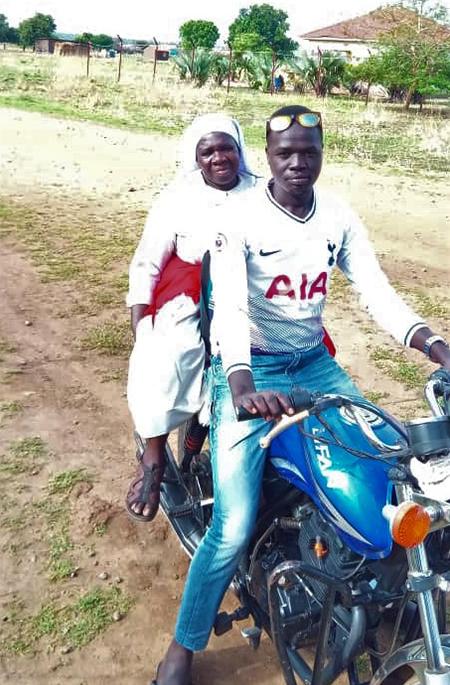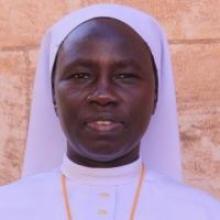
The sun rises Feb. 5 in Juba, South Sudan. (CNS/Paul Haring)
When you are angry at someone, what is your first response? Consider how some people can respond in ways that are peaceful and calming.
First, locate South Sudan on a map of the African continent to see where this story takes place. After long conflicts with groups in the northern part of Sudan that led to a deadly civil war, South Sudan became a new country in 2011. Then, from 2013 to 2020, a civil war was fought in the new country, leading to more violence, poverty and hunger. More than a decade later, these problems remain in many areas of this nation. As you read, take note of the situations that contribute to the violence the young people in the article are exposed to; reflect on the challenges of teaching nonviolence in a land that has seen ongoing violent conflict.
Sisters teach nonviolence in South Sudan
My observation is that, generally, sisters in Eastern Africa are steadily responding to the cry of the poor. With the publication of the Laudato Si' encyclical of Pope Francis, sisters accelerated their advocacy drive and responses to the cry of the poor, propelled by both the Laudato Si' Action Platform, and the demands of Justice, Peace and Integrity of Creation, or JPIC, at national and regional levels.
Sacred Heart Sr. Mary Atimango and her team are setting out to bring healing to the fragile political state of South Sudan. Although the young nation has its sociopolitical instabilities, it has registered great milestones in peace initiatives that continue today. Justice, Peace and Integrity of Creation collaborators continue to promote human dignity and respect for God's creation in the region.
A remarkable success in South Sudan started when 14 sisters from different congregations made the Nonviolence Training of Trainers with Pax Christi International October 2022 in Juba. These sisters went out to train different groups of people, especially those susceptible to violent tendencies such as the youth, the girl-child school dropouts, street children, boda-boda riders (hired motorcyclists), candidates in formation houses, and learners at all levels of education.
As in the saying, "Be the agent of the change that you want to see tomorrow," Sister Mary found the task strongly linked with issues of justice and peace. "In Juba Archdiocese, the consecrated women were not involved in JPIC; this is the first time they are involved," she observed.
Sister Mary approached candidates in formation houses, pupils and students in both primary and secondary schools, and street boys and girls, including a group who kill people using machetes (pangas). "I managed to train over 189 of such people and [am] still in position to meet more groups," Atimango said.

Sr. Mary Atimango, ready to reach out to participants of the nonviolence program (Courtesy of Mary Atimango)
Atimango, who doubles as assistant head teacher, has worked in South Sudan for almost two years. She met with 87 pupils in primary school and primarily targeted the inculcation of values. "The learners knew peace icons like Nelson Mandela of South Africa and Mahatma Gandhi of India, an indication that these pupils knew that peace is possible without violence," she noted.
She also chose 68 secondary school students, considered young adults because they could distinguish between good and bad. Having had a previous training in peace-building, their response was warm and enthusiastic, and nonviolence training was not new to them. Surprisingly, the administration of both primary and secondary schools supported the program because the learners would acquire skills of peaceful coexistence.
A bit nervous, but courageous, Sister Mary met 16 boys and girls from the toughest street gang. They were skeptical with her at first, but later opened up.
"So far we have seven meetings with this group, feared most in the local community. Surprisingly, their numbers increased each time we met. We have bonded well with them and they are very free to share anything with me!" Atimango exclaimed.
Most of the tough gang members confessed that they resorted to criminal activities because of joblessness. Another one commented that the nonviolent communication training was helpful, and asked Sister Mary's permission to invite other friends to join the training.
Sister Mary said that the gang members keep calling her — and more surprisingly — some of them invited their parents to attend the nonviolence training. She received an overwhelming response from the parents who appreciated the invitation and feel joy for what the "new teaching" has done to their children! She enthusiastically revealed that she is organizing a big event for the parents, and said it was a big achievement for her.
The gang members surprised Sister Mary when they said, "You are the only person who cares about us, and nobody comes to us to say good things like you do! Will you come again? We want you to come again."
Atimango is calling for more sisters trained at the national level in order to engage in forming more youth as potential change-makers in nonviolence. She recommends training target groups in income-generating projects, to discourage idleness and equip them with life skills to protect them from criminal activities like stealing, drug abuse and murder.
However, a big challenge she faces is a lack of transport to get people to the workshops. It is hard to get the target groups to sessions, especially the gang members who are initially skeptical about being exposed to the new ideas.
Some of the older children have expressed interest in vocational training where they can acquire hands-on skills, but the sisters cannot afford to sponsor such trainings. Sr. Mary Atimango also recommends that in order to have an impact, parents of the youth should be trained in nonviolence skills. They would learn how to solve domestic problems amicably through negotiations, conflict management skills, reconciliation and how to use the tools for peace-building at home, rather than infamous child abuse.
And remember that tough gang that killed people with machetes? They changed their name from a derogatory term to "St. Paul Youth." Conversion at work!
Such persistent initiatives are needed in Africa much more than ever. People — including politicians — trust and confide in sisters. Let us use this God-given opportunity to bring light to the continent of Africa.
How do you think violent conflict impacts young people living in South Sudan?
What else contributes to young people's acting out in violent speech and actions?
How does the nonviolent training impact the families of the young people who come to the sessions? How can it improve family life?
What did you learn about the possibilities of nonviolence from this article?
What qualities does Sister Mary demonstrate in her work to promote nonviolence?
Why do you think Sister Mary has been successful in spreading the message of nonviolence? Why is her work so important?
Why is it important to make it a priority to train young people in nonviolence?
Pope Francis noted in his message for the 2017 World Day of Peace that "Jesus himself lived in violent times," but his message was one of love and nonviolence. "He taught his disciples to love their enemies (Matthew 5:44) and to turn the other cheek (Matthew 5:39). When he stopped her accusers from stoning the woman caught in adultery (John 8:1-11), and when, on the night before he died, he told Peter to put away his sword (Matthew 26:52), Jesus marked out the path of nonviolence."
Jesus models nonviolence in the Scriptures: Why is it so challenging to follow his model and disavow violence in speech and action? How can you keep Jesus' teaching in mind as you interact with others so you can practice nonviolence?
Jesus steps into situations to stop other people from acting in violent ways; how can you help others to be nonviolent?
Francis declared in his 2017 message for the World Day of Peace, "Violence is not the cure for our broken world. Countering violence with violence leads at best to forced migrations and enormous suffering. ... At worst, it can lead to the death, physical and spiritual, of many people, if not of all."
In a 2023 video, Francis said, "Let us make nonviolence a guide for our actions, both in daily life and in international relations." He called for people of faith to "pray for a more widespread culture of nonviolence," which involves reducing the use of weapons both by nation states and by citizens.
What did Francis point out was the cause of violence and weapons in our world?
Why did Francis want the culture of nonviolence to guide individuals as well as nation states in all aspects of life and relationships with others? Why is this so challenging in our world today?
Pope Leo XIV is continuing Francis' message of peace and nonviolence. In May 2025, he said that children and young people "need the witness of men and women who embody a different and nonviolent way of living. ... Whenever those who have suffered injustice and violence resist the temptation to seek revenge, they become the most credible agents of nonviolent peacebuilding processes."
Why do you think Leo promotes role models for nonviolence? What positive impact have role models made on your own life? In what ways can you become a role model for practicing nonviolence?
Sister Mary demonstrates great hope and courage as she promotes a culture of nonviolence in South Sudan. How can you follow her model, have hope for changes in your community, and display courage in sharing the challenge of nonviolence?
Find out if it is possible to bring in someone to your school or church community to speak about nonviolence: See if there is a local chapter of the Catholic peace organization, Pax Christi USA: https//paxchristiusa.org/who-we-are/regions.
Read about nonviolent role models such as Mohandas Gandhi, who led the nonviolent movement in India to gain freedom from the British; American civil rights leader Martin Luther King Jr.; and Dorothy Day, who is being considered for sainthood because of her work for the poor, her concern with justice for those on the margins, and her commitment to peace and nonviolence.
Find out if any institution or organization in your community provides training in nonviolence, or look online for remote nonviolence training so you can better model people of faith who promoted nonviolence.
Christ, you model for us a nonviolent life; guide us as we reflect on your teaching and as we work to respond to your challenge of rejecting all forms of violence. Fill us with hope as we seek out people of faith who chose to reject violence and to work for reconciliation. Give us the courage to become like these peacemakers as we practice the nonviolence you call us to. Amen.
Tell us what you think about this resource, or give us ideas for other resources you'd like to see, by contacting us at [email protected].
